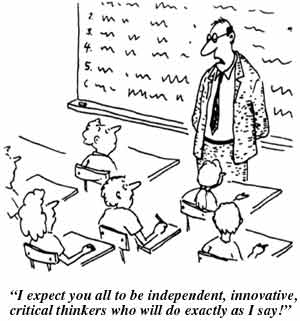It’s accidental really. You start off with every intention of making your classroom entirely focused on learning. You’re not going to let the small stuff bother you, you’re a patient person. You know every kid is different and not everybody learns the same way, much less the way you learned.
In fact, chances are you even believe with all your heart that your classroom is in fact, 100% focused on learning. Trouble is there are two things teachers frequently “focus” on by accident. Despite our best efforts, we do them based on habit – years of just trying to survive the workday massively outnumbered, overworked and underappreciated. While we weren’t looking, we ended up focusing on student behavior and task completion, rather than actual learning.
1) To focus on learning, avoid focusing on student behavior.
Most teachers would cite “student behavior” as the biggest obstacle to being focused on learning. In reality, the biggest reason why teacher’s aren’t focused on learning is because they’re focused on student behavior. Yes, there’s a difference.

Many teachers spend an exuberant amount of time stressing and punishing kids in the name of “teaching responsibility”. Consider that late work (or no work), tardiness and bringing supplies to class are all issues that frustrate teachers. We ridicule, we punish, we take off points, etc., yet all of these are examples of “executive functions” of the prefrontal cortex, a part of the brain that many researchers now believe is not fully developed until the late teens to early twenties. [1] [2][3]
Anybody else make any really bad decisions in college they wouldn’t dare dream of making now?
Teachers love to throw out the “we’re preparing them for the real world” argument. Yes, the real world is cold and dark. It’s an awful place full of parasites and predators. Students will be FORCED to work for ruthless bosses who will fire you for showing up late or forgetting supplies! </sarcasm>
Give me a break. If that’s the world you live in, find a new world. Nobody really believes that and anybody who does shouldn’t be in education. You know what will help kids avoid THAT world? An education, so if they find themselves working for such a person they can tell them to take the stick out of their butt and go find a new job. Even if the “real world” is that difficult, and the lessons do need to be learned, do they have to be learned by 14 years old?
Consider the work Rick Wormeli, who points out in this sensational video that "LSATs, MCATS, Praxis exams...all allowed to be re-done over and over again for FULL CREDIT....it's a weak teacher who doesn't allow re-do's and do-overs cause your not teaching to make sure he learns it, you're teaching to make sure he learns it on the conveyer belt."
There are a lot of very successful people in this world that were jerks, the United States Congress runs late on a regular basis and there are plenty of adults that can’t sit still in a chair (look around at your next faulty meeting). Regardless of your words, if your actions are such that correcting these behaviors is the purpose of your existence as a teacher, you’re in for a very long and frustrating career. And you’re not focused on learning.
2) To focus on learning, avoid focusing on just “doing stuff” instead of “learning stuff”.
Behavioral expectations on steroids aren’t the only thing that can cause a classroom teacher to lose focus either. Before you ask your students to do something, consider why you’re asking them. Will completing those questions in the book REALLY help them learn the material? Will copying those notes off the board EXACTLY as you wrote them REALLY increase their knowledge? Or would teaching them to summarize information and compile their own notes not only teach them important learning strategies but help them learn the content as well?
 One final point about work that doesn’t reflect learning. In the history of global education, no child has ever learned anything from a freaking “Word Search.” Yet, teachers at every level continue to hand out this moronic piece of busy work. Can they be fun? I suppose. Are they teaching anything? I doubt it – and keep your arguments about how they “teach” spelling. We’ll pass.
One final point about work that doesn’t reflect learning. In the history of global education, no child has ever learned anything from a freaking “Word Search.” Yet, teachers at every level continue to hand out this moronic piece of busy work. Can they be fun? I suppose. Are they teaching anything? I doubt it – and keep your arguments about how they “teach” spelling. We’ll pass.
Over reliance on worksheets or rote memorization can stand in the way of actual learning too.
If your students are “learning” things for the test, passing the test, and then flushing them to never be seen or heard from again, then the material was never really “learned” in the first place. If the knowledge can’t be taught to somebody else, or applied in a useful manner, what was the point? There is no cooler moment in a classroom than when a student quits worrying about their grade and starts trying to learn the material because they feel like they “need to know this” and take ownership of their learning. It’s not magic, it’s a classroom culture that must be conveyed, encouraged and required by the teacher.
The single best indicator if a teacher is focused on task completion rather than learning is to have a look at what their gradebook reflects. Some grading policies reward task completion, for example, grading for completion has NOTHING to do with student learning. “But if I don’t give them points for it, they won’t do it!” B.S. The student’s who care about the grade will do it, but they’d have done it anyway! The students you can’t get to complete work don’t care about their grades, otherwise they’d complete their work! Here’s a radical idea, consider explaining to students the purpose of the assignment. “This is summative, it’s to determine what you really know and will be for a grade. This is formative, it’s practice. I won’t be grading it, but we’ll be looking at it together to help us determine what you still need help on before the summative assessment.”
If you REALLY want to push the boundaries of this “Focus on Learning” thing, then consider you’re your grades actually reflect. Do they reflect student growth? Student knowledge? Or are they some conglomeration of responsibility, task completion, knowledge and skills. Do the zeros in your gradebook represent a lack of the student’s knowledge? Or do they merely represent non-compliance, a behavioral concern that should be reported in a different manner all-together? Do harsh late work penalties really encourage students to get work done on time? Or do they merely punish students who can’t while encouraging students for “playing school”. Accurate grading is essential, as is developing a “growth mindset” where students are more interested in improving their knowledge and skills than in simply jumping through the teacher’s hoops.
These two problems represent an epidemic across classrooms of every grade level. Teachers believe they are forced to give busy work assignments, grade everything, take off points for late work and give completion points as a means of controlling students. Similarly, they struggle with forgotten supplies and incomplete assignments, and thus kid themselves into believing they’re teaching responsibility when in fact they’re punishing kids for behaviors they may not be developmentally able to correct.
Instead, teachers should lesson plan and be prepared every day to give quality assignments that only reflect student understanding of a content objective. Students should be taught that not every assignment will be graded, but every assignment will HELP THEM learn the content and skills they need to succeed on summative assessments later. Recognize student behavior for what it is, the manifestations of a developing brain creating obstacles to classroom learning. Find ways to overcome those obstacles individually, without damaging student relationships or distorting grades designed to report achievement. By making these two significant changes, teachers and students will be MUCH MORE prepared to focus on learning and be much happier in the classroom.
[1] "Maturation of the Prefrontal Cortex."Maturation of the Prefrontal Cortex. U.S. Department of Health and Human Services, n.d. Web. 23 July 2012. <https://www.hhs.gov/opa/familylife/tech_assistance/etraining/adolescent_brain/Development/prefrontal_cortex/>.
[2] Spinks, Sarah. "Adolescent Brains Are a Work in Progress."PBS. PBS, 9 Mar. 2000. Web. 23 July 2012. <https://www.pbs.org/wgbh/pages/frontline/shows/teenbrain/work/adolescent.html>
[3] Miller, Earl K., David J. Freedman, and Johnathan D. Wallis.The Prefrontal Cortex:categories, Concepts and Cognition.The Prefrontal Cortex:categories, Concepts and Cognition. The National Center for Biotechnology Information, 30 July 2002. Web. <https://www.ncbi.nlm.nih.gov/pmc/articles/PMC1693009/pdf/12217179.pdf>.


